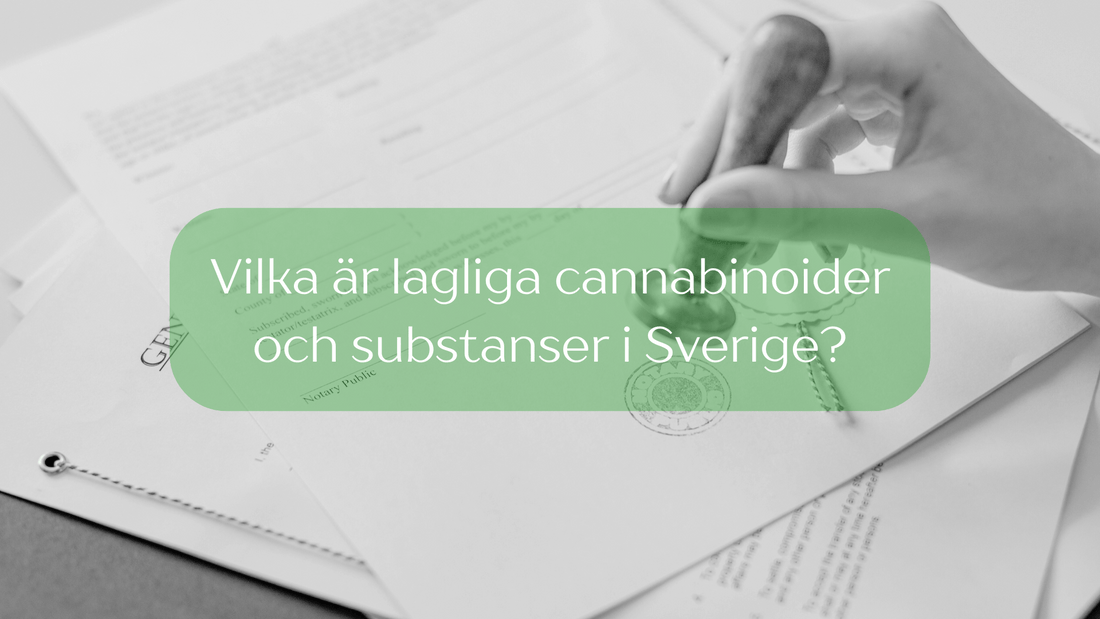
Legal cannabinoids & substances in Sweden
Dela
Keeping track of which cannabinoids are legal in Sweden can be complicated. Legislation changes continuously and new substances are added, which makes it important to always have access to updated information. We have made it our mission to monitor and report the latest changes, so that you as a consumer can feel confident in your purchasing decisions.
On our status page you will find a complete overview of current cannabinoids and substances, both those that are legal and those that have been banned. Here we go through some of the cannabinoids that are currently legal in Sweden, along with their status and areas of use.
Legal cannabinoids & substances in Sweden
CC9
CC9 is a newer cannabinoid that is currently legal in Sweden. Although research into this substance is still limited, it is used in more and more products. It has quickly gained attention thanks to its unique properties and its wide range of applications.
CBD (Cannabidiol)
CBD is one of the most popular cannabinoids and is well known for its purported positive effects on well-being. In Sweden, CBD is legal as long as it does not contain THC, the psychoactive component that is banned. CBD is used in a variety of products, from oils to cosmetics and supplements.
THCB – Under investigation
THCB is a relatively newly discovered cannabinoid that is still being researched for its effects and potential uses. It is currently legal in Sweden, but it is under investigation to determine its future status.
THCH – Bills in progress
THCH is a powerful cannabinoid that is still legal. However, legislative proposals have been put forward that may affect its future availability. If you are interested in this substance, it is important to stay up to date on any changes.
THCJD
This lesser known cannabinoid is legal and is mainly used in specialized products. Although THCJD is not yet as established as other cannabinoids, it is starting to gain attention thanks to its unique structure and properties.
Kratom – Legal in powder form
Kratom is a plant-based substance that is legal in powder form in Sweden. It is primarily used as a dietary supplement and has become popular among those seeking natural alternatives for energy and focus. Important to note is that some forms of kratom may be regulated in other countries.
Nitrous oxide – Under investigation
Nitrous oxide, or nitrous oxide, is used in medicine and catering but is also a substance that is closely scrutinized. It is currently legal in Sweden, but it is under investigation for potential regulations.
THCNM
One of the newer cannabinoids on the market. THCNM is legal and is starting to gain a foothold in specialty products. It is of particular interest to researchers and producers exploring new applications for cannabinoids.
Muscimol
Muscimol is an active component found naturally in the fly agaric (Amanita muscaria). The substance is legal in Sweden and is used in certain special products, often in connection with its potential relaxing and calming effects.
10-OH-THC, 10-OH-HHC and 10-OH-HHCP
These three derivatives are innovative variations of THC and HHC and are currently legal in Sweden. They are mainly used in vape products and are popular among those looking for new and alternative experiences.
While several cannabinoids are legal, it is also important to know which substances have been banned. Here is a list of substances that are no longer allowed in Sweden.
Illegal cannabinoids & substances in Sweden
THC – Banned in 1968
The psychoactive substance THC, which is known for its effects in cannabis, was banned in Sweden back in 1968. It is still illegal and strictly regulated.
HHC – Banned in 2023
HHC, a semi-synthetic cannabinoid, was recently banned in Sweden. It became popular as an alternative to THC, but regulations changed quickly.
THCP, THCA and HHCO – Banned in 2024
These three substances have all been banned in the same year. Despite their popularity and growing use, they fell under stricter laws.
Delta-8 THC, Delta-9 THC and Delta-10 THC
Delta-9 THC, the main psychoactive component of cannabis, was banned in 1968. Its closely related derivatives Delta-8 THC and Delta-10 THC were banned in 2024 as part of wider regulations surrounding synthetic cannabinoids.
A few last words..
Keeping up-to-date on the legislation surrounding cannabinoids is important. If you have questions or want to know more about a specific substance, you are always welcome to contact our customer service. We help you find answers and make informed choices.
